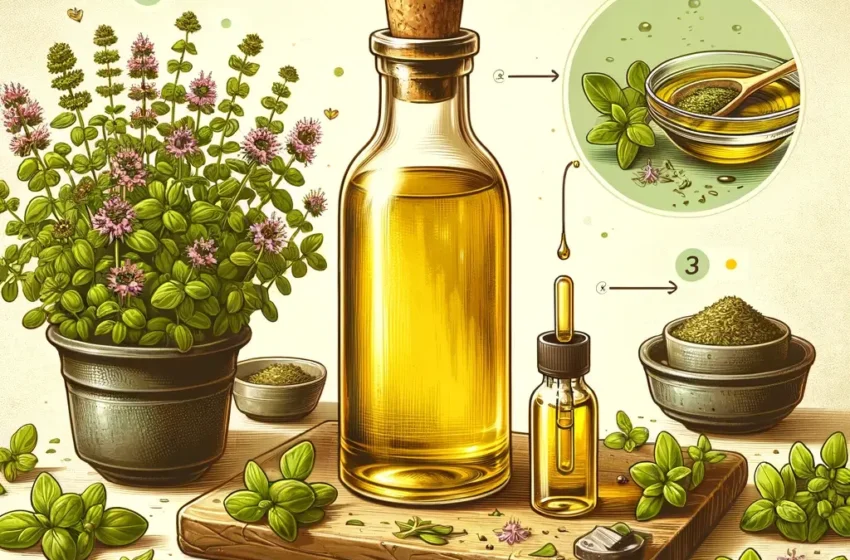Homemade Oregano Oil Recipe: A Natural Remedy and Flavor Booster
As a food reviewer who’s tasted countless dishes and ingredients from around the globe, I’ve stumbled upon an array of spices and herbs that elevate dishes from good to extraordinary. One such gem in the culinary world is oregano oil. Not just a flavor booster, this aromatic oil doubles as a natural remedy for various ailments. Today, I’ll guide you through a simple, step-by-step process to make your own oregano oil at home. Let’s dive into what makes this oil a must-have in your pantry and how you can prepare it with ease.
What is Oregano Oil?
Oregano oil is a concentrated liquid that captures the essence of oregano herbs through extraction or infusion methods. Known for its robust flavor and health benefits, including antibacterial and anti-inflammatory properties, oregano oil is a versatile ingredient in cooking and a staple in home remedies.
How To Make Oregano Oil Recipe
- Preparation Time
10 minutes - Cooking Time
20 minutes
Steeping Time
2 weeks - Serves
This recipe yields approximately 2 cups of oregano oil. - Difficulty
Easy
Ingredients
- 1 cup of fresh oregano leaves
- 2 cups of olive oil (or any carrier oil of your choice, like almond or grapeseed oil)
Equipment
- Glass jar with a tight lid
- Small saucepan
- Cheesecloth or fine mesh strainer
- Bowl
Instructions
Step 1: Prepare the Oregano
Start by thoroughly washing the oregano leaves to remove any dirt. Pat them dry with a clean towel. This step is crucial to prevent any moisture from getting into your oil, which can lead to spoilage.
Step 2: Infuse the Oil
Chop the oregano leaves finely to increase the surface area for the infusion. In your saucepan, gently heat the carrier oil over low heat until it is warm but not smoking. Add the chopped oregano leaves to the oil, and let the mixture simmer on low heat for about 5-10 minutes. Be cautious not to overheat the oil to retain the herb’s flavors and benefits.
Step 3: Let It Steep
After heating, transfer the mixture to a glass jar and seal it tightly. Let the mixture steep for at least two weeks in a cool, dark place. The longer it steeps, the stronger the flavor and potency of the oil.
Step 4: Strain the Oil
Once the oil has infused to your liking, strain it using a cheesecloth or a fine mesh strainer into a bowl. Make sure to squeeze out as much oil as possible from the leaves.
Step 5: Store Properly
Transfer the strained oil into a clean, dry glass bottle or jar. Store it in a cool, dark place. If prepared and stored correctly, homemade oregano oil can last up to a year.
Pro Tips For Oregano Oil Recipe
- Opt for organic oregano leaves to ensure your oil is free from pesticides and chemicals.
- You can adjust the potency by varying the steeping time. Longer steeping periods result in stronger flavors.
- Label your oregano oil with the date of preparation to keep track of its shelf life.
Why You Will Love This Oregano Oil Recipe
- Health Benefits: Oregano oil is a natural antioxidant and has anti-inflammatory properties.
- Versatility: It can be used in culinary applications, as a salad dressing, or to add depth to sauces and marinades. It’s also an effective remedy for colds and sore throats.
- Ease of Preparation: This recipe requires minimal ingredients and effort, making it accessible to anyone interested in homemade remedies and culinary experiments.
How to Use Oregano Oil
In cooking, use oregano oil sparingly due to its potent flavor. It works wonderfully as a finishing oil for Mediterranean dishes, pizzas, pastas, and grilled vegetables. As a health supplement, you can dilute it with water or mix it with a carrier oil before applying it topically or consuming it.
Conclusion
Making your own oregano oil at home is a rewarding and straightforward process that yields a versatile and beneficial product. Whether you’re looking to enhance your culinary creations or seeking natural remedies for health concerns, homemade oregano oil is a wonderful addition to your repertoire.
If you’ve enjoyed this recipe and found it helpful, please feel free to share it with friends and family. Your support means the world to us!
You Can Also Read:- Annies Recipes Sweet Amish Pickles
FAQ: Homemade Oregano Oil
1. What is oregano oil used for?
Oregano oil is widely used both for its culinary flavors and its health benefits, which include antimicrobial and anti-inflammatory properties.
2. Can I use dried oregano instead of fresh?
Yes, you can use dried oregano, but the flavor may be more intense, so you might want to adjust the quantity.
3. How long does homemade oregano oil last?
If stored properly in a cool, dark place, homemade oregano oil can last up to a year.
4. Can I use coconut oil as a carrier oil?
Yes, coconut oil is a good option, but keep in mind it solidifies at cooler temperatures.
5. How do I know when the oil is ready?
The oil is ready when it has adopted the aroma and flavor of oregano, usually after steeping for at least two weeks.
6. Can homemade oregano oil be used for medicinal purposes?
Yes, it can be used for its antibacterial and anti-inflammatory effects, but consult a healthcare provider for advice on its use for specific health issues.
7. Can I heat the oil and oregano mixture in the microwave?
It’s not recommended, as controlling the temperature is crucial, and microwaves can heat unevenly.
8. How should oregano oil be stored?
Store it in an airtight glass container in a cool, dark place to preserve its quality.
9. Is it safe to consume oregano oil directly?
It’s potent, so it’s usually diluted with a carrier oil or mixed into food or beverages before consumption.
10. Can I make oregano oil without heating?
Yes, you can simply steep the fresh oregano in oil for a longer period without heating, although the result may differ slightly.
11. What are the signs that oregano oil has gone bad?
A change in color, smell, or the presence of mold indicates that the oil has spoiled.
12. Can I use oregano oil on my skin?
Yes, but it should be diluted with a carrier oil to avoid irritation.
13. How often can I apply oregano oil topically?
It depends on the purpose and your skin’s sensitivity. Start with less frequent applications to test your tolerance.
14. Can oregano oil help with respiratory issues?
Yes, its antimicrobial properties can be beneficial, but it should be used as part of a comprehensive treatment plan.
15. How can I use oregano oil in cooking?
It’s a potent flavor enhancer, so use it sparingly in sauces, dressings, and marinades.
16. Can I make oregano oil with other herbs?
Absolutely! Feel free to experiment by adding or substituting with herbs like thyme or rosemary.
17. Is homemade oregano oil as effective as store-bought?
Homemade oregano oil can be just as effective, though the concentration of active compounds may vary.
18. Can I freeze oregano oil to extend its shelf life?
Freezing can alter the oil’s properties and is not recommended.
19. What’s the best way to extract oregano oil?
The infusion method described here is simple and effective for home preparation.
20. Can oregano oil be used in a diffuser for aromatherapy?
Yes, it can be used in a diffuser to benefit from its aromatic properties.
21. Does oregano oil interact with medications?
Oregano oil can interact with certain medications, so consult a healthcare professional before use.
22. Can pregnant or breastfeeding women use oregano oil?
Pregnant or breastfeeding women should consult a healthcare provider before using oregano oil.
23. Can children use oregano oil?
Consult a pediatrician before using oregano oil for or on children.
24. How does oregano oil compare to olive oil in terms of health benefits?
While both have health benefits, oregano oil is known for its antimicrobial properties, while olive oil is praised for its heart health benefits.
25. Can oregano oil help with digestion?
Yes, it can aid in digestion and help alleviate digestive issues due to its antimicrobial properties.
26. Is it normal for oregano oil to have a strong smell?
Yes, oregano oil has a potent, distinctive aroma due to the concentration of essential oils.
27. Can I use oregano oil to treat fungal infections?
Oregano oil has antifungal properties, but consult a healthcare provider for appropriate treatment.
28. How do I dilute oregano oil for consumption?
Mix a few drops of oregano oil with a carrier oil or into a beverage like tea or water.
29. Can oregano oil be used every day?
While it can be used regularly, it’s important to monitor for any adverse reactions and consult with a healthcare provider.
30. Does oregano oil help with allergies?
Oregano oil may help with allergies due to its anti-inflammatory properties, but it should not replace traditional allergy treatments.
31. What are the benefits of placing oregano oil under the tongue?
Placing oregano oil under the tongue allows for quicker absorption into the bloodstream, maximizing its therapeutic effects. This method is believed to enhance its antimicrobial properties and support immune health. However, it’s essential to dilute oregano oil properly and consult a healthcare professional for guidance on dosage and usage to avoid potential side effects.












